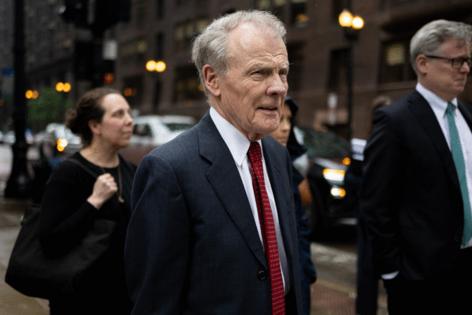Ex-Illinos House Speaker Michael Madigan asks to remain free on bond pending appeal
Published in News & Features
CHICAGO — Attorneys for former House Speaker Michael Madigan have formally asked that he remain free on bond pending appeal of his conviction on sweeping corruption charges, arguing in a filing Monday night he’s not a flight risk and that there are complex legal issues which, if resolved in his favor, will require a new trial.
Madigan, 83, was sentenced last month to 7 1/2 years in prison and ordered to report by Oct. 13. But in their 21-page motion, Madigan’s attorneys signaled they will file a vigorous appeal, and argued he should not spend time behind bars until after it is resolved — which could take a year or more.
Such requests are fairly common in white collar cases where there were significant legal issues, which Madigan’s case certainly contained. But convincing a judge who sentenced a defendant to prison that they should remain free can be challenging, particularly when the same judge already ruled before or during the trial on the issues being raised.
Madigan’s defense team acknowledged that U.S. District Judge John Robert Blakey already “resolved the issues discussed” in their motion, but said “few areas of criminal law are more complex, and more rapidly evolving, than federal bribery law.”
Much of the uncertainty stems from a U.S. Supreme Court decision last year that substantially reined in prosecutions under a federal bribery law known as 666, its number in the federal code.
In its decision in the bribery case of former Portage, Indiana, Mayor James Snyder, the high court ruled that “gratuities” — or gifts given as a thank-you for actions a public official has already taken — are not criminalized under the federal statute, and that prosecutors must prove there was an agreement ahead of time, often referred to by the Latin quid pro quo.
Madigan’s motion argued that Blakey’s instructions to the jury erred in part by focusing “on the intent of the bribe-giver, not the recipient,” flipping what prosecutors are actually required by statute to prove.
The judge also incorrectly modified the language in the instructions to say payments to Madigan’s associates be “in connection with … official duties,” the motion stated.
The instructions also were flawed when it came to the “heavily litigated definition of ‘corruptly,'” Madigan’s team argued, “and the crucial instruction on “stream of benefits,” the motion stated.
The motion also challenges Blakey’s decision to admit the now-infamous wiretapped recording of Madigan telling his co-defendant, Michael McClain, that some of their associates had “made out like bandits.” McClain responded, “For very little money too.”
The judge initially barred the jury from hearing the conversation, which began with a discussion about a labor consultant who was on ComEd’s payroll, not one of the subcontractors that were part of the indictment. But Blakey but let in after Madigan testified he didn’t know ComEd was paying his associates for no work.
“The substantial questions, if resolved in Madigan’s favor, are likely to result in reversal of all convictions or a new trial,” Madigan’s attorneys said.
After a trial that stretched nearly four months, Madigan was convicted by a jury Feb. 12 on bribery conspiracy and other corruption charges. The jury found him guilty on 10 of 23 counts, including a multipronged scheme to accept and solicit payments from ComEd to Madigan associates for do-nothing subcontracts.
Madigan also was convicted on six out of seven counts — including wire fraud and Travel Act violations — regarding a plan to get then-Chicago Ald. Daniel Solis, who testified at length in the trial, appointed to a state board.
The jury acquitted Madigan of several other schemes alleged in the indictment and deadlocked on other counts, including the overarching racketeering charge.
In handing down the 90-month prison term on June 13, Blakey said Madigan’s crimes represented “abuse of power at the highest level” and were aggravated by the fact that Madigan had every advantage in life, including a privileged education and a thriving law practice.
The judge also found that Madigan lied repeatedly and willfully when testifying in his own defense during the trial. Blakey called it “a nauseating display of perjury and evasion” that was “hard to watch.”
____
©2025 Chicago Tribune. Visit at chicagotribune.com. Distributed by Tribune Content Agency, LLC.







Comments